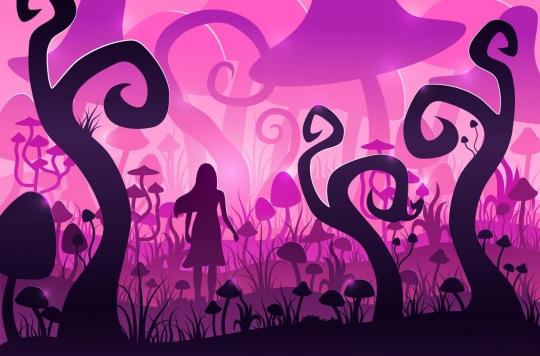According to a new study, psylocybin, the active ingredient of hallucinogenic mushrooms, would have an effect on the claustrum, a key brain area in self-perception and a priori reduced in depressed people.

- Psilocybin, present in hallucinogenic mushrooms, modifies the claustrum, an area of the brain often reduced in depressed people.
- “This imaging study provides a better understanding of the mechanisms underlying how psilocybin works in the brain.”
- In France, nearly 9 million people have experienced or will experience depression during their lifetime, i.e. one person in seven.
It has been several years since the scientific studies analyze the effects of “psychedelic drugs” on anxiety, stress or depression. In 2017, researchers had for the first time succeeded in observing the effects on the brain of psilocybin, the active ingredient of hallucinogenic mushrooms. They had concluded that this substance could improve the condition of people suffering from depression, resistant to traditional antidepressants.
Today, American researchers are interested in the effects of this psilocybin on the claustrum, an area of the brain presented by experts as a key in cerebral regulation and seat of self-perception and consciousness. However, in depression, patients often express the feeling of being disconnected from themselves. According to the results of the study published in the journal NeuroImage, the claustrum would be very sensitive to psylocybin, the active ingredient of hallucinogenic mushrooms. Eventually, this discovery could pave the way for potential treatments.
For their study, researchers from the Department of Psychiatry at the Johns Hopkins Medicine Center in Baltimore (United States) selected 15 volunteers and administered either the substance or a placebo. The participants then lay down on a sofa with glasses and headphones. They listened to music before being driven by car to facilities.functional magnetic resonance imaging (fMRI).
Reduced claustrum activity
The images were taken one hour after taking the drug or placebo. Result: the hallucinogen acts directly on the cloister, reducing its activity by 15 to 30%. This phenomenon seemed to be associated with the emotional and mystical experiences experienced by the participants. This slowing would have repercussions on hearing, attention, decision-making and memorization and would be similar to the feeling often expressed by depressed people of being disconnected from themselves.
In 2016, other work carried out post mortem had already shown that, in people suffering from depression or schizophrenia, the claustrum was reduced.
The present study has some limitations, however, the researchers concede. Since the placebo is always administered first, this has “reduces the potential carry-over effects of exposure, as the significant effects of this dose in healthy individuals may persist for at least 6 h after administration”they write in particular.
“A better understanding of the mechanisms”
At any rate, “this imaging study provides a better understanding of the mechanisms underlying how psilocybin works in the brain,” comments Dr. Frederick Barrett, professor of psychiatry and behavioral sciences at Johns Hopkins.
In conclusion, the authors of the paper recommend conducting more research on the subject. “As a future direction that could apply broadly to the field of psychedelics, comparing the effects of psychedelic drugs in participants with and without prior exposure to psychedelics will be important in understanding the interactions between the acute and long-lasting effects of these compounds.”they say.
Depression is the most common mental illness there is. Worldwide, 264 million people are affected, according to WHO estimates. In France, Public health France estimates that nearly 9 million people have experienced or will experience depression in their lifetime, or one in seven people.

.

















